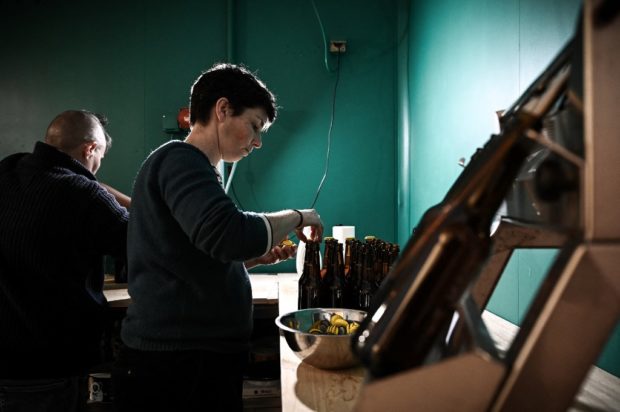French brewers return beer to its feminine roots

Founders of the small beer brasserie “Y’a Une Sorciere Dans Ma Biere” (“There’s a Witch in my Beer”) Vero Lanceron, 44, (R) and her partner Vero Verisson, 49, (left, background) bottle beer in their brasserie on April 7, 2022, in La Reole, southwestern France. (Photo by Philippe LOPEZ / Agence France-Presse)
LA REOLE, France — When Vero and Vero started making beer, they thought they were part of a new trend of women asserting themselves in a traditionally male-dominated industry — only to discover that beer actually has ancient feminine roots.
“We were just two women who liked beer and wanted to do something on our own,” said Vero Lanceron, 44, cofounder of Y’a Une Sorciere Dans Ma Biere (“There’s a Witch in my Beer”), a small brasserie in the town of La Reole in southwest France.
From the start, theirs was an adamantly feminist enterprise — the word is on their business cards.
But it was only when they began researching the beer industry that they realized they were part of a much older tradition.
“In the collective imagination, there’s this idea that beer is mostly for men,” said Lanceron’s partner Vero Verisson, 49, adding with a chuckle: “Unsurprisingly, that is something we strongly refute.”
Article continues after this advertisementThe first recorded beer recipe was written on a piece of clay in 1800 BC as an ode to Ninkasi, the Sumerian goddess of beer.
Article continues after this advertisementAround the same time in Mesopotamia, the earliest-known laws, the Code of Hammurabi, included several rules for brewers and tavern owners—always referred to as “she.”
Beer making remained primarily a women’s affair into the Middle Ages, when low-alcohol fermented ale was a nutritious drink for the whole family.
Since it didn’t keep, women often sold the excess to neighbors, giving them some financial independence and leading many to open taverns in their homes.
It was only when brewing became a more profitable pastime, that it was increasingly taken over by men.
‘Alewives’
The Catholic Church declared “alewives” to be immoral and unclean temptresses — a handy argument for its monks as they took over brewing in their abbeys.
“As soon as it started making serious money, men got interested,” said journalist Anais LeCoq, who lays out the history in a new book “Maltriarcat.”
“The final straw was the industrial revolution when brewing was industrialized. Women were barred from having capital, property or higher education so naturally they disappeared from the profession.”
Things have changed radically with the recent trend for craft beers and small-scale brasseries—many of them run by women.
There are dozens of women-led breweries in Britain and the United States, for example, who have set up networks such as Project Venus in the UK.
“We see it with young people who are very interested in our beer, and don’t find it all strange that we are female brewers,” said Verisson. “With the older generation, by contrast, we sometimes have to do some explaining.”